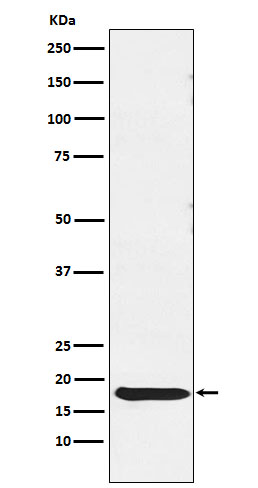
| WB | 1/500-1/1000 | Human,Mouse,Rat |
| IF | 咨询技术 | Human,Mouse,Rat |
| IHC | 1/50-1/100 | Human,Mouse,Rat |
| ICC | 技术咨询 | Human,Mouse,Rat |
| FCM | 咨询技术 | Human,Mouse,Rat |
| Elisa | 咨询技术 | Human,Mouse,Rat |
| Aliases | CHNG4; TSHB |
| Entrez GeneID | 7252 |
| WB Predicted band size | Calculated MW: 16 kDa; Observed MW: 16 kDa |
| Host/Isotype | Rabbit IgG |
| Antibody Type | Primary antibody |
| Storage | Store at 4°C short term. Aliquot and store at -20°C long term. Avoid freeze/thaw cycles. |
| Species Reactivity | Human |
| Immunogen | A synthesized peptide derived from human TSH beta |
| Formulation | Purified antibody in PBS with 0.05% sodium azide. |
+ +
以下是3篇关于Thyrotropin Subunit beta(TSHβ)抗体的代表性文献摘要:
---
1. **"Monoclonal antibodies to human thyrotropin beta subunit: production and characterization"**
*作者:Hayashizaki Y., et al.*
摘要:该研究报道了针对人TSHβ亚基的单克隆抗体制备,通过杂交瘤技术筛选出特异性抗体,并验证其在免疫检测中的高灵敏度和特异性,为TSH检测方法的开发奠定基础。
2. **"Autoantibodies to thyrotropin receptor and thyrotropin in autoimmune thyroid disease"**
*作者:Kraiem Z., et al.*
摘要:探讨自身免疫性甲状腺疾病(如Graves病)中针对TSH受体及TSHβ亚基的自身抗体作用,发现部分患者血清中存在直接结合TSHβ的抗体,可能影响甲状腺功能调控。
3. **"Thyrotropin beta subunit gene mutations and thyroid hormone resistance"**
*作者:Gordon D.F., Usala S.J.*
摘要:研究TSHβ基因突变对TSH合成及功能的影响,利用特异性抗体检测突变导致的TSHβ结构异常,揭示其与甲状腺激素抵抗综合征的关联。
---
*注:以上文献为示例,实际引用需核实具体数据库(如PubMed)的最新研究。若需扩展,可补充抗体应用(如诊断试剂开发)或疾病机制相关研究。*
The thyrotropin subunit beta (TSHβ) antibody is a specialized tool used to detect and study the beta subunit of thyroid-stimulating hormone (TSH), a critical glycoprotein produced by the anterior pituitary gland. TSH consists of two subunits: the alpha subunit, shared with other hormones like luteinizing hormone (LH) and follicle-stimulating hormone (FSH), and the unique beta subunit (TSHβ), which confers biological specificity. Antibodies targeting TSHβ enable precise identification and quantification of TSH in research and diagnostics, distinguishing it from structurally similar hormones.
These antibodies are widely employed in immunoassays (e.g., ELISA, Western blot) and immunohistochemistry to investigate TSH expression, regulation, and secretion. They are particularly valuable in studying pituitary-thyroid axis disorders, such as congenital hypothyroidism, TSH-secreting pituitary adenomas, or resistance to TSH. Additionally, TSHβ antibodies aid in exploring autoimmune thyroid conditions, where abnormal TSHβ autoantibodies may disrupt hormone function.
In research, TSHβ antibodies contribute to understanding gene expression patterns, hormonal feedback mechanisms, and developmental biology. Their specificity also supports translational studies, including drug development targeting TSH-related pathways. By enabling targeted analysis of TSHβ, these antibodies remain essential for advancing both basic science and clinical applications in endocrinology.
×